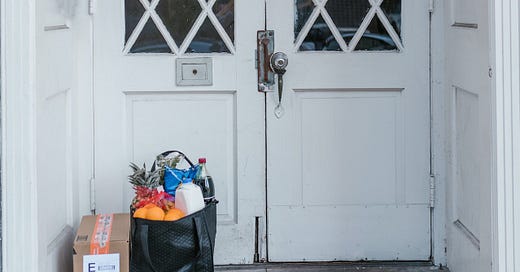In modern society, everything revolves around renting convenience, a system where ownership is an illusion, and we labor to afford fleeting access to necessities and comforts. We don’t truly own anything—our homes, food, or even our time are leased through endless payments, subscriptions, and obligations. The moment you can’t pay, you’re locked out of this carefully curated world of convenience, deemed a failure, and shamed for not keeping up.
Housing is the most glaring example of this rented existence. For most, owning a home outright is a distant dream. Instead, people rent apartments or commit to mortgages, which are essentially decades-long leases on debt. In 2025, the average U.S. renter spends 30-40% of their income on housing, with median rents for a one-bedroom apartment hovering around $1,800-$2,200 in major cities. This forces millions to work grueling hours just to keep a roof over their heads. Miss a single payment, and the consequences are swift: eviction, your belongings discarded on the street, a stark reminder that housing isn’t a right but a service you lease. Even those who “own” their homes are never truly free. Property taxes, averaging $3,000-$5,000 annually in many states, coupled with maintenance costs and rising insurance premiums, mean you’re perpetually paying for the privilege of staying in your own house. Fail to keep up, and the bank or government can seize your property, proving that homeownership is just another subscription—one with lifelong fees and no true security. The convenience of a stable place to sleep comes at the cost of eternal financial vigilance, and defaulting leaves you cast out, unable to afford the basic shelter society markets as a necessity.
Food, another fundamental need, is similarly trapped in this cycle of rented convenience. Few of us grow our own crops or raise livestock; instead, we rely on grocery stores, meal delivery kits, or fast food, all engineered for ease but at a steep price. The average American household spends over $8,300 a year on food, according to 2024 data, a constant expense to access pre-packaged, pre-prepared sustenance. Convenience stores and fast food chains capitalize on this, offering instant gratification for those too exhausted from long workdays to cook from scratch. But this convenience is a trap. Ultra-processed foods, while cheaper upfront, contribute to chronic health issues like obesity and diabetes, locking you into another cycle of renting medical care—doctor visits, prescriptions, and insurance premiums that can cost thousands annually. If you can’t afford groceries or a meal plan, you’re left scavenging, relying on food banks, or facing hunger, shamed for failing to meet the basic human need for nourishment. The system ensures you’re always one missed paycheck away from food insecurity, reinforcing your dependence on its costly, convenient supply chain.
This cycle of rented convenience begins early, embedded in the very structure of modern life. From childhood, we’re funneled into a system that demands compliance: go to school, accrue debt, and secure a “good job” to afford the endless subscriptions that define existence. Education, once a path to knowledge, has become a conditioning tool, preparing us to accept a lifetime of labor to pay for housing, food, streaming services, car leases, gym memberships, and every other fragment of the modern lifestyle. The average U.S. student loan debt in 2025 is $39,000, with borrowers paying hundreds monthly for decades to “own” their education—a purchase that doesn’t guarantee a job but ensures lifelong financial obligations. Society ruthlessly shames those who can’t keep up, labeling them lazy, uneducated, or parasitic if they fail to pay their rent—whether it’s for an apartment, a Netflix account, or their place in the social hierarchy. The pressure to conform is unyielding: get the degree, climb the corporate ladder, or be deemed unworthy of the conveniences everyone else is renting. This isn’t about freedom or true ownership; it’s about keeping you tethered to a system where you work tirelessly to afford a life you never fully possess.
Even the things you “buy” come with hidden rental fees, ensuring you’re never free from payments. A car, for instance, isn’t just a one-time purchase; you pay for insurance, maintenance, registration, and fuel—costs that can total $10,000 a year for the average driver. Fail to keep up, and your car is repossessed or becomes a financial burden you can’t use. Electronics, like your phone or laptop, require ongoing software subscriptions, cloud storage fees, and repair costs to remain functional. Even physical items like furniture or appliances demand upkeep—cleaning supplies, warranties, or replacement parts—to stay in your home without breaking down. Every possession carries an invisible lease, a continuous drain on your resources to maintain its place in your life. From the moment you acquire something, you’re locked into paying for its existence, a cycle that doesn’t end until you do.
The system is designed to keep you paying, shaming you when you stumble, and dangling just enough comfort to keep you chasing the next convenience. If you can’t afford your rent—whether it’s for your apartment, your meal kit, your car, or your place in society—you’re effectively priced out of existence. Opting out isn’t an option; the world of rented convenience leaves no room for alternatives. You’re conditioned to work, rent, and obey, trapped in a society where everything is leased, and true ownership—over your home, your sustenance, or your life—remains an illusion you’ll pay for until the end.




The horrors of the modern world, and the more I look at it the more it bears a striking resemblance to a communist society where you own nothing, and the corporate and the state can take away your comforts, needs and privilege if you cannot keep up with their expectations.
Also sorry for being literally brown. I tried to be more light skinned.